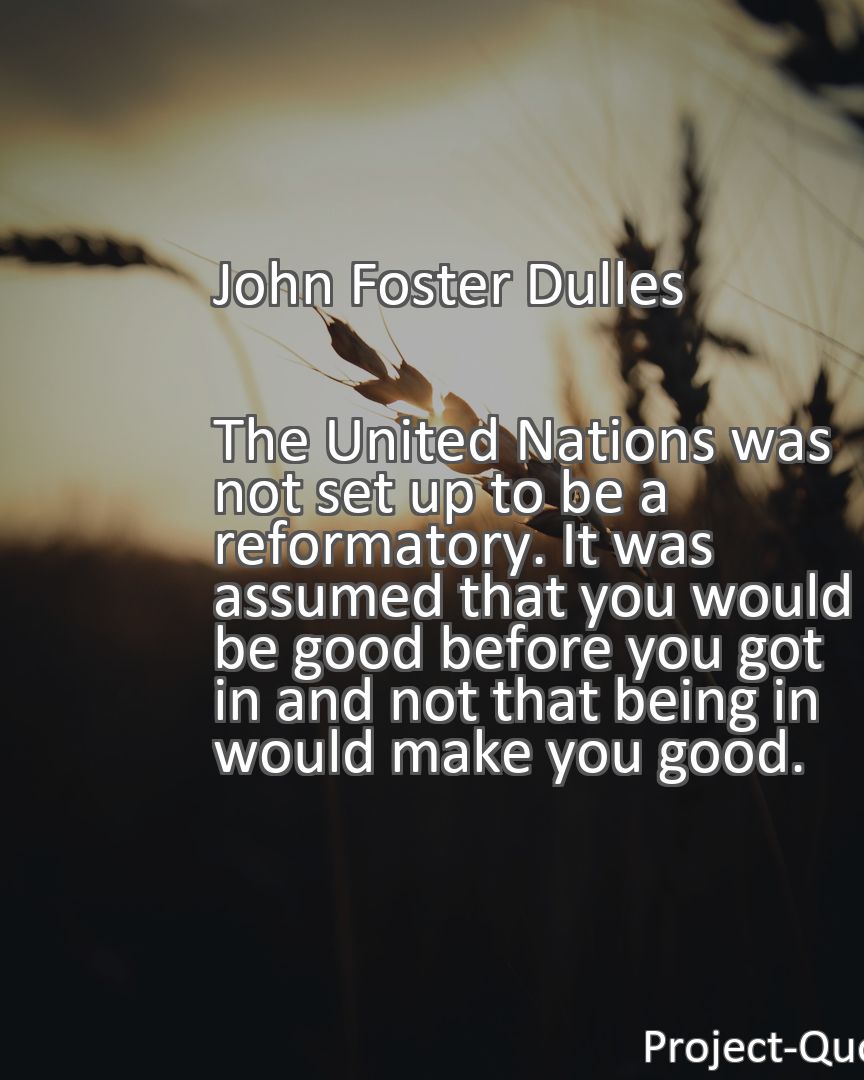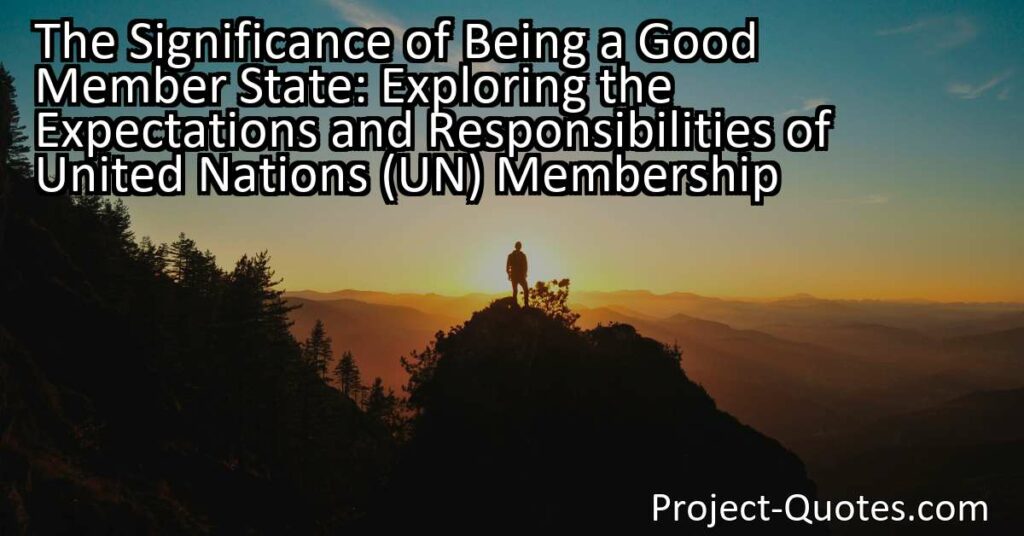The United Nations was not set up to be a reformatory. It was assumed that you would be good before you got in and not that being in would make you good.
John Foster Dulles
The significance of being a good member state in the United Nations (UN) is emphasized through the quote, “The United Nations was not set up to be a reformatory.” This quote highlights that UN membership requires nations to already be “good” and upholding the values of peace, security, and human rights. The behavior and actions of each member state carry immense weight in determining the overall success of the organization in addressing global challenges.
Table of Contents
- 1 The United Nations was not set up to be a reformatory. It was assumed that you would be good before you got in and not that being in would make you good.
- 2 John Foster Dulles
- 3 Meaning of Quote – The United Nations was not set up to be a reformatory. It was assumed that you would be good before you got in and not that being in would make you good.
- 4 Freely Shareable Quote Image
- 5 Related
Meaning of Quote – The United Nations was not set up to be a reformatory. It was assumed that you would be good before you got in and not that being in would make you good.
The quote “The United Nations was not set up to be a reformatory. It was assumed that you would be good before you got in and not that being in would make you good” holds a profound message about the purpose and expectations of the United Nations (UN). In simpler terms, this quote suggests that the UN was created with the intention of bringing together already “good” nations, not to miraculously transform or reform their behavior. Let’s delve deeper into this idea and explore the significance of this quote in relation to the establishment, role, and challenges faced by the United Nations.
To understand the quote’s context, we have to look back at the formation of the UN. The organization was established on October 24, 1945, in the aftermath of World War II, with the primary aim of preventing such devastating conflicts in the future. Its creation was driven by the aspiration to build a more peaceful and cooperative world order. Instead of treating the UN as a reformatory, where nations with problematic behavior would be transformed into “good” ones, the organization assumed that nations joining the UN would already be inclined to uphold peace, security, and human rights.
This assumption is rooted in the belief that nations with a shared commitment to international law and fundamental values would willingly cooperate and coordinate their efforts in pursuing collective interests. By bringing these like-minded nations together, the UN aimed to foster global dialogue, promote understanding, and encourage joint action on various global challenges such as poverty, inequality, climate change, and armed conflicts.
The quote also implies that simply being a member of the United Nations does not automatically make a nation “good.” In other words, the UN is not a magical fix to eradicate existing problems or to transform nations with questionable behaviors into model members of the international community. Instead, the UN relies on the shared values, principles, and commitments of its member states to guide their actions and shape their behavior.
While this principle of assuming nations are “good” before joining the UN is optimistic, it does not ignore the reality that conflicts and challenges persist within member states. The UN acts as a platform for member nations to address these issues collectively and to find peaceful resolutions. However, the limitations of the UN lie in its dependence on the political will and cooperation of its member states to actively work towards peaceful solutions.
In its pursuit to maintain international peace and security, the UN established the Security Council as its chief decision-making body. The Security Council is composed of fifteen member states, five of which hold permanent seats with veto power. This structure ensures that influential nations have a voice in shaping the UN’s agenda and taking actions when necessary. However, it also poses challenges when member states’ interests clash or when divisive politics impede collective decision-making.
A notable example of these challenges can be observed in the Syrian conflict, which has been ongoing since 2011. Despite numerous urgent appeals for action to end the violence and protect civilians, the Security Council has been unable to present a unified front to effectively address the crisis. Veto power has been used multiple times by permanent members, causing divisions and hampering collective action. This situation highlights the importance of member states upholding the principle of being “good” and aligning their actions with the shared objectives of the UN, rather than using their influence to undermine progress.
The UN’s success or failure in fulfilling its mandate is not solely dependent on its structure but also on the commitment demonstrated by its member states. The organization operates through various specialized agencies, programs, and funds that address specific global issues. These entities provide assistance, expertise, and coordination to member states, enabling them to address challenges and advance shared goals. However, the impact of these efforts is often contingent upon funding, support, and participation from member states.
The quote reminds us that while the UN can facilitate dialogue and provide resources, it ultimately relies on nations to be proactive in their pursuit of global peace, justice, and development. The organization can work as a catalyst and a convener, but it cannot single-handedly impose change upon its members. To achieve meaningful progress, nations must embody the values and principles enshrined in the UN Charter and collaborate towards a common vision.
Furthermore, the quote implies that member states have an ethical responsibility to maintain their commitment to upholding international law, human rights, and sustainable development, both within their own borders and in their interactions with other nations. Being a part of the UN community should inspire nations to continually reflect upon their behavior and make necessary improvements, rather than expecting membership to absolve them of any shortcomings.
In this sense, the UN serves as a platform for nations to learn from one another, share best practices, and collectively overcome challenges. By exchanging experiences and expertise, member states can find inspiration to improve their governance, promote human rights, and address social and economic disparities more effectively. The UN facilitates this exchange through its various forums, summits, conferences, and working groups, creating spaces for dialogue and cooperation.
To truly harness the potential of the United Nations, member states must understand and embody the spirit of the quote. They must recognize that the UN was not designed to act as a reformatory but rather as an arena where already “good” nations come together to forge a path towards a better world. Consequently, the behavior and actions of each member state carry immense weight in determining the overall success of the organization.
If nations fulfill their commitments and strive to act in accordance with the principles of the UN Charter, the organization can unlock its full potential to address the pressing issues of our time. By upholding peace, promoting sustainable development, protecting human rights, and fostering international cooperation, member states can collectively effect positive change that benefits not only their own citizens but the entire global community.
In conclusion, the quote by highlighting that the United Nations was not established as a reformatory but as a union of already “good” nations, emphasizes the expectations and responsibilities that come with UN membership. The UN relies on member states to uphold the values and principles embedded in its Charter, and to actively pursue peaceful resolutions, development, and safeguarding of human rights. Rather than expecting the UN to miraculously transform nations, the organization acts as a platform for collaboration and dialogue, empowering member states to work together for a better world. By understanding and embodying the essence of this quote, the United Nations and its member states can embark on a collective journey towards a more peaceful, just, and sustainable future.
I hope this quote inspired image brings you hope and peace. Share it with someone who needs it today!


